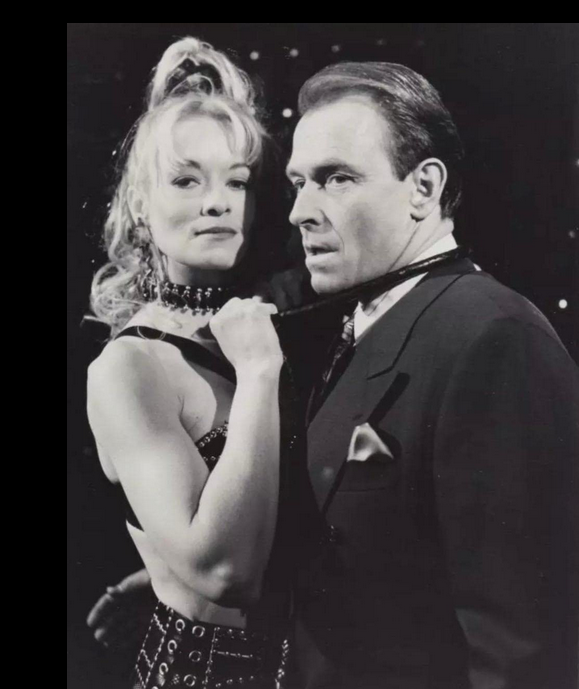
L.A. Law S07E10 “Spanky and the Art Gang”, aired January 14, 1993
L.A. Law was an ensemble dramedy about a Los Angeles law firm. LIke detective procedurals, legal procedurals bring the characters into a variety of situations, and one popular topic is BDSM, usually in the form of pro dominatrixes.
In this case, the law firm takes as a client Claudia Von Rault, aka Mistress Zenia (played by Lillian D’Arc). She’s charged with involuntary manslaughter of Eric Schuller, who died during a session. The lawyers are initially reluctant to take the sensational case, but the deceased had business entanglements with the firm’s partners and they want it handled in-house.
This entire plotline unfolds in court, and the accused is only seen in business attire, so there’s little or no visual exploitation. The prosecution sometimes waves around a leather flogger.
The lawyers debate how to handle the case, and whether to urge her to plead for a suspended sentence. Daniel, the lead, wants to go with the plea bargain. The deceased’s widow calls the accused a “whore” to her face.
In court, the prosecutor questions Schuller’s doctor and establishes the condition of the dead’s man body, with welts on his buttocks, and also that Eric had a previous heart attack. Daniel establishes that the doctor said Schuller could resume sexual activity.
Schuller’s widow testifies to her belief that Von Rault got her husband to put her in his will, and then killed him.
In the witness box, Von Rault explains her work and what she did with Schuller.
Von Rault: “There’s dominance and submission in all human sexuality. When someone hugs you part of them is possessing, holding you captive. But submissive people, those like Mr. Schuler, outnumber dominants seven to one.”
She also describes that she placed a ping pong ball in Schuller’s hand as a safe signal when gagged. That was the first time he had ever dropped the ball in years of sessions.
Daniel: “Ms Von Rault, was it necessary to strike Mr. Schuler repeatedly and with force.”
Van Roult: “Yes, the therapy session–”
The prosecution interrupts with an objection that she’s not a qualified therapist. Daniel says she has a PhD in behavioral sciences. The judge overrules.
Von Roult: “Mr Schuler had a high threshold. If I didn’t hit hard, he felt I didn’t care.”
Daniel: “Did you care?”
Von Roult: “He was a dear friend. It broke my heart to know the burden of guilt he carried.”
[…]
Van Roult: “Freud suggested children who aren’t punished and never spanked and then forgiven in love sometimes become masochistic. Eric Schuller paid me to be his mother, to whip him, and afterwards put my arms around him and say I loved him.”
Daniel: “What would happen then?”
Van Roult: “He would break down and cry.”
Summing up to the jury, the prosecutor calls Miss Van Rault:
Prosecutor: “… an entrepreneur of horror, a pain merchant, and total cynic. There is a limit, even as adults, to what we may consent. Eric Schuler did not consent to his own murder, and yet that’s exactly what he got. Knowing full well of his weakened condition and earlier heart attack, Miss Van Rault beat him to death and kept the money. You must not let her get away with that.”
Daniel explains the definition of manslaughter to the jury.
Daniel: “What Miss Von Rault does for a living may be considered by most to be distasteful, warped even, but criminal? Not by law. Eric Schuller assured Miss Von Rault of his physical condition and voluntarily consented to everything she did. She knew Mr Schuller’s body, his life story, better than his own wife. Claudia Van Rault and Eric Schuller trusted one another. It was not her intent to hurt, but to heal.”
The jury says “not guilty”.
Von Rault says “Thank you” to Arnie Becker, then bites him lightly on the lip. “Did that hurt?” she asks flirtatiously.
A recurring trope in stories about pro dominatrixes is that they act like therapists and may even have psychological or psychiatric backgrounds. E.g. Lady Heather Kessler in CSI retired as a pro-domme and became a therapist, and Tiff in Bonding becomes a pro-domme to pay for therapist school. While there are certain similarities, pro-dommes are not caring professionals, have no qualifications, and aren’t bound by medical ethics or regulations.
The frequency with which fictional pro dominatrixes are likened to therapists serves the dual function of legitimizing the domme as a sympathetic character, a bourgeois healing professional instead of a mercenary sex worker in a quasi-legal field, and legitimizing the practice of BDSM itself as a form of therapy, instead of symptom of a mental illness or just a perverse form of sexual pleasure.
If the dominatrix wasn’t framed as a healing professional, the jury in the courtroom (and the viewing audience at home) would be less likely to view her positively. They might believe the accusation that Von Rault got herself named in the deceased’s will and killed him, even though it’s pure speculation that she is in the will at all. Or they might have viewed his death as the result of her negligence.



